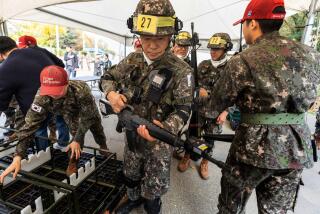REGIONAL REPORT : Many Southland Firms Don’t Have Backup Plans for Military Reservists
- Share via
The news that President Bush may begin to call up the military reserves as a result of the Middle East crisis has caught most Southland companies flat-footed, without even a ballpark figure on how many of their employees serve in the reserves.
Although many have personnel policies covering military leave, few firms have developed contingency plans to deal with prolonged employee absences that could result from a broad-based call-up of the reserves.
The President can order reserve officers and enlisted men to active duty for up to 180 days without asking for congressional authorization or declaring a national emergency. There are an estimated 87,000 reservists in California.
Most firms’ policies on reserve duty cover only the two weeks of annual training required of non-active reserves.
Federal law requires companies to rehire employees who leave for active-duty military service into the same job or an equivalent job with equivalent salary. And they must retain seniority and benefits, such as pensions, as if they had never left the company.
But companies can use their own discretion as to whether to pay reservists and whether to continue medical and other benefits.
Jack Fay, a spokesman at Bergen Brunswig Corp., a pharmaceutical and videotape distributor in Costa Mesa, said his firm would pay the difference between an employee’s salary and the military salary for as long as the reserve service lasted.
In contrast, Fluor Corp., the Irvine-based engineering and construction giant, will make up the pay differential for 30 days and allow employees to retain benefits indefinitely, a spokeswoman said.
At AST Research Inc., an Irvine personal computer vendor, the salary differential is paid for two weeks as a matter of policy, with a longer period granted on a case-by-case basis, according to human resources director Howard Derman.
Many firms grant the two-week payment based on the normal time that reservists are away on training. Maj. Austin Smith of the National Committee for Employer Support of the Guard and Reserve said his organization had fielded many calls in the past few days from employers who wanted to know what their obligations are for a longer stint. The committee is an interservice organization within the Pentagon.
Smith said his organization encouraged companies to pay medical benefits for 30 days until the military benefits kicked in for all the reservist’s dependents. Most companies, he added, do not pay a salary benefit for a prolonged period.
Martin Binkin, a military analyst at the Brookings Institution, said he doubted that any immediate reserve call-up would be large enough to have major impact on the commercial sector, especially since most reservists are not likely to be in high-level positions.
“It’s not really a very large portion of the work force,” he said, speculating that 50,000 to 75,000 was a likely number for the initial call-up. The President can call up only 200,000, he noted, without congressional permission.
But with 1.17 million people nationwide in the selective reserve--which includes the National Guard and the Army, Navy, Air Force and Marine Reserves--the impact could be much more dramatic if the Middle East conflict gets worse.
Analysts anticipate that the first reserves to be called would be doctors, and a variety of other support personnel, such as mechanics and drivers, would follow. But most health-care companies contacted Monday did not seem concerned.
Maxicare Health Plans Inc., a Los Angeles-based health maintenance organization, does not anticipate that it will lose many employees, and officials are not worried that a call-up would deplete the doctor groups with which the HMO contracts for client health care, spokesman Ed Coughlin said.
With more than 800 doctors on staff, Torrance Memorial Medical Center would not be hurt by even a major exodus of Army Reserve doctors, spokeswoman Barbara Peterson said.
“We don’t think think that it is going to have an effect,” Peterson said. As for a contingency plan, “At this point they (hospital officials) are not very worried about trying to formulate something real quick,” she said.
Loran Shook, executive vice president at Community Psychiatric Centers, which runs a chain of psychiatric and drug treatment clinics, echoed that view. “That won’t impact us at all. We have several thousand physicians, and we’ll be in fine shape.” He did not know how many CPC doctors were in the reserves.
Few firms appeared to be paying close attention to the situation. AST is an exception. Derman said the company had about a dozen people in the reserves, including several in management positions.
James M. Montgomery Consulting Engineers in Pasadena had a more typical approach. “We haven’t even really given it much thought,” said Susan Day, supervising human resources administrator. The company’s policy is to grant unpaid military leave.
Times staff writers Nancy Rivera Brooks in Los Angeles and Mark Stencel in San Diego contributed to this report.
More to Read
Inside the business of entertainment
The Wide Shot brings you news, analysis and insights on everything from streaming wars to production — and what it all means for the future.
You may occasionally receive promotional content from the Los Angeles Times.










